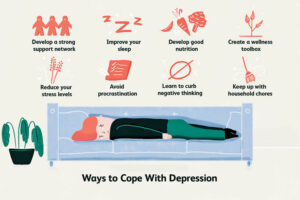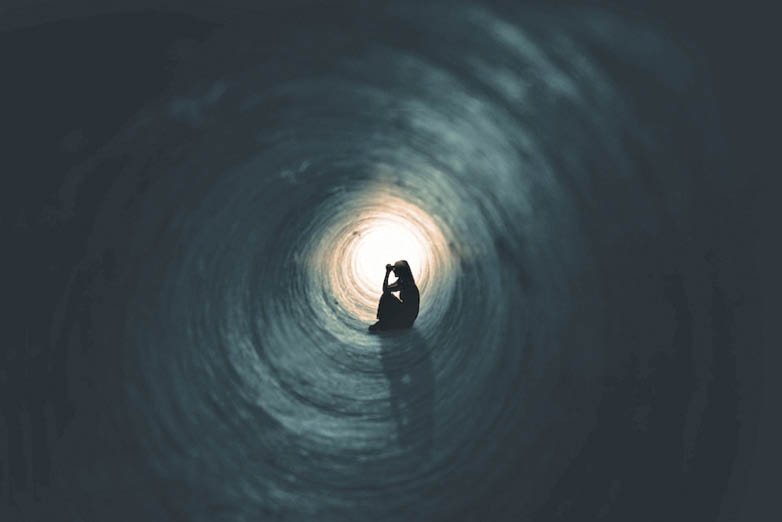 Depression is a term often used loosely to describe how we feel after a bad week at work or when we’re going through a breakup or some negative experience. However, clinical depression is much more complicated. Here are some insights to help you distinguish the difference between depression and other common negative emotions like sadness or grief.
Depression is a term often used loosely to describe how we feel after a bad week at work or when we’re going through a breakup or some negative experience. However, clinical depression is much more complicated. Here are some insights to help you distinguish the difference between depression and other common negative emotions like sadness or grief.
Sadness Or Depression? Understanding the difference… Feeling sad is a natural reaction to situations that cause emotional upset or pain. Sadness is a normal human emotion that everyone experiences at various times in life. Unfortunate life events can leave people feeling varying degrees of sadness – loss or absence of a loved one, divorce, job-loss, financial trouble, or issues at home, failing an exam, etc.
However, a person experiencing sadness can usually find some relief from crying, venting, or talking out one’s frustrations. Sadness is temporary and often, has links to a specific trigger. In this way, sadness differs from depression.
Depression on the other hand, is a longer-term mental illness. Depression is a mental disorder that has an overpowering and debilitating impact on many areas of a person’s life. It alters behaviours and attitudes. It impairs social, occupational, and other important areas of functioning. Left untreated, symptoms of depression may last for a long time.
Depression Or Grief? Grief tends to decrease over time and occurs in waves that are triggered by thoughts or reminders of its cause. This is how it differs from depression, which is more pervasive and persistent throughout all situations. A grieving person may feel relatively better in certain situations, such as when friends and family are around to support them. But triggers like the birthday of a deceased loved one or going to a wedding after having finalized a divorce, could cause the feelings to resurface more strongly.
Depression tends to be present constantly, immaterial of the circumstances. While grief usually causes a person to feel a longing for or an urge to see their lost loved one again, depression has the opposite result, where one may not feel the urge to do anything or see anyone.
Understanding Depression… Depression affects all aspects of your life, making it hard or even impossible to find joy or happiness in anything, including activities and people you used to enjoy. Most importantly you need to understand that Depression is a mental illness, not an emotion. Symptoms could include Constant feelings of sadness, Irritability, Fatigue, Changes in sleeping /eating patterns, Difficulty concentrating, Loss of interest and enthusiasm for things which used to provide pleasure, Feelings of deep, unwarranted guilt, Headaches or body aches that do not have a specific cause, Feelings of worthlessness, Constant thoughts about death or Suicidal thoughts or actions.
You may have some of these symptoms if you are sad, but they shouldn’t last more than two weeks. Remember, suicidal thoughts are a sign of depression, not sadness.
When Should You Seek Help? It is crucial to talk to your doctor if you experience sadness for longer than two weeks. And call emergency services to receive immediate medical help if you’re having suicidal thoughts. Note if your feelings interfere with your ability to function normally or participate in everyday life activities or in experiencing joy. Speaking to a professional therapist, a family member or any trusted person, serves as a powerful first step toward recovery.
Treatment: Depending on the severity and pattern of depressive episodes over time, health-care providers may offer a combination of options. Depression is treatable and managing symptoms usually involves three components:
- Support: This can range from discussing practical solutions and possible causes to educating family members.
- Psychotherapy: Also known as talking therapy, some options include one-to-one counselling and therapeutic interventions such as Cognitive Behavioural Therapy (CBT).
- Medicines: A doctor could prescribe anti-depressants.
Simple Tips For Those Dealing With Depressive Symptoms: Being depressed can make us feel helpless- but that’s not the reality. Along with therapy and sometimes medication, there’s a lot you can do to help yourself. Bringing about certain modifications in your physical activity, lifestyle, and even your way of thinking – all serve as useful tools in combatting depression. Here are a few things you can try:
- Get In A Routine: Setting a daily schedule helps you get back on track and deal with the symptoms effectively.
- Set Goals:When you’re depressed, you feel like you can’t accomplish anything. That makes you feel worse about yourself. To push back, set daily goals for yourself. Small, simple daily goals are all that you need to begin with. As you start to feel better, you can add more challenging goals.
- Exercise:Physical activity daily is a must.
- Eat Healthy: There is no magic diet that fixes depression. Watch what you eat. If depression tends to make you overeat, getting in control of your eating will help you feel better and in control of yourself again.
- Get Enough Sleep:Depression makes it hard to get enough shut-eye. Sleep deprivation worsens depression. Practicing good sleep hygiene goes a long way.
- Challenge Negative Thoughts:The war with depression is fought mentally, we need to change how we think. The human mind tends to gravitate towards the negative / worst conclusions. This triggers more sadness and helplessness. When negative thoughts hit you – make a conscious effort to stop them and evaluate whether they’re accurate. Ask yourself how you would respond to a friend who thought the worst of themselves. Apply the same to you.
- Do Something New:When you’re depressed, you’re in a rut. Push yourself, against all your mental resistance, to do something different – go to a park or garden, pick up a hobby, volunteer at a shelter.
- Avoid Alcohol And Other Drugs:These are highly preventable because these provide temporary escape, but could cost you dearly as these can become addictions.
- દિકરી એટલે બીજી માં… - 20 April2024
- નાગપુરની બાઈ હીરાબાઈ એમ. મુલાનદરેમહેરનો ઇતિહાસ - 20 April2024
- વિશ્વ ભારતી સંસ્થાન દ્વારા રતિ વાડિયાનુંસન્માન કરવામાં આવ્યું - 20 April2024
